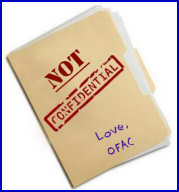 My colleague Stan Marcuss points out that the Office of Foreign Assets Control (“OFAC”) appears to have changed course in treating Freedom of Information Act (“FOIA”) requests and has decided to hand out OFAC license applications willy-nilly to anyone who can afford a postage stamp. Several years ago, after someone requested copies of all licenses to ship food, medicine and medical devices to Iran, OFAC sent letters to the affected parties asking them if they wished to assert protection under Exemption 4 of the FOIA which exempts from disclosure confidential commercial information. If a licensee asserted the exemption, OFAC normally would withhold the license from disclosure.
My colleague Stan Marcuss points out that the Office of Foreign Assets Control (“OFAC”) appears to have changed course in treating Freedom of Information Act (“FOIA”) requests and has decided to hand out OFAC license applications willy-nilly to anyone who can afford a postage stamp. Several years ago, after someone requested copies of all licenses to ship food, medicine and medical devices to Iran, OFAC sent letters to the affected parties asking them if they wished to assert protection under Exemption 4 of the FOIA which exempts from disclosure confidential commercial information. If a licensee asserted the exemption, OFAC normally would withhold the license from disclosure.
Now, citing the new administration’s policy of transparency, OFAC has sent letters indicating that these licenses will be released to the public. The filing of such a license, and the contents thereof, will be freely disclosed over the objection of the licensee even though such disclosure may discourage some from filing these licenses in the future, clearly in contravention of the Trade Sanctions Reform and Export Enhancement Act of 2000 which clearly sought to encourage the export of such humanitarian supplies to sanctioned countries. Even if we don’t like the government of Iran, Congress passed TSRA because it did not want to see the people of Iran deprived of food and life-saving medicines and medical devices. Those requesting TSRA licenses, of course, don’t really have those interests in mind.
At least two things make OFAC’s new position more than a little absurd. OFAC is still using FOIA Exemption 6 to black out the names of any individuals mentioned in disclosed documents. The absurdity here is that this policy is even used to withhold the names of terrorist and other specially designated nationals (“SDNs”)Â when releasing information on enforcement actions against companies that have engaged in transactions with SDNs. That means, of course, that Osama Bin Laden has more protections under OFAC’s interpretation of the FOIA than an exporter shipping food to a sanctioned country.
Worse, when an agency promises transparency, one might reasonably assume that transparency would extend to providing information on export enforcement cases that might actually assist exporters in trying to interpret and to understand the scope of OFAC’s vaguely worded regulations. Â Not so. Â OFAC continues to release as little information as possible about enforcement actions. Â That sort of transparency would prevent the OFAC from being able to use ambiguities in its own regulations to deter certain exports — a practice I like to call in terrorem regulation.
Apparently, what’s transparent for the goose isn’t really transparent for the gander.
 Permalink
Permalink
Copyright © 2010 Clif Burns. All Rights Reserved.
(No republication, syndication or use permitted without my consent.)

 Posted by
Posted by  Category:
Category: 

